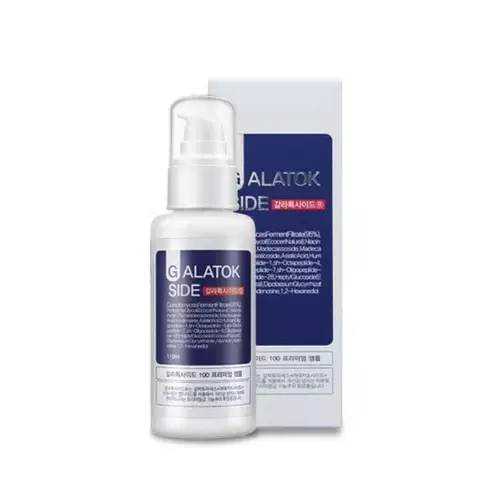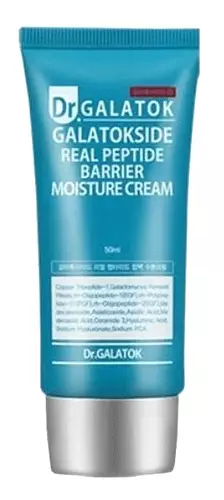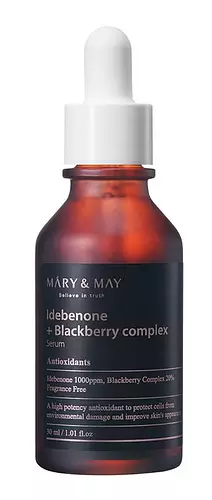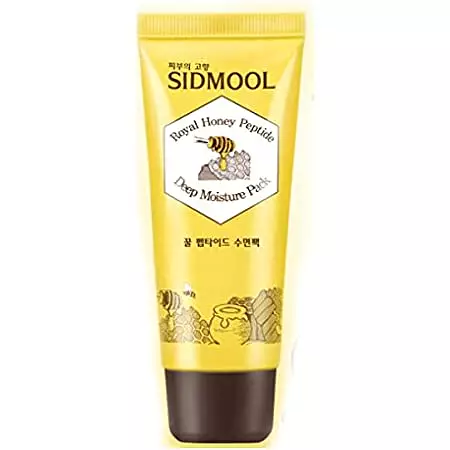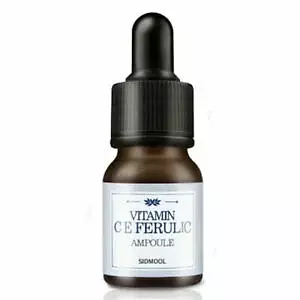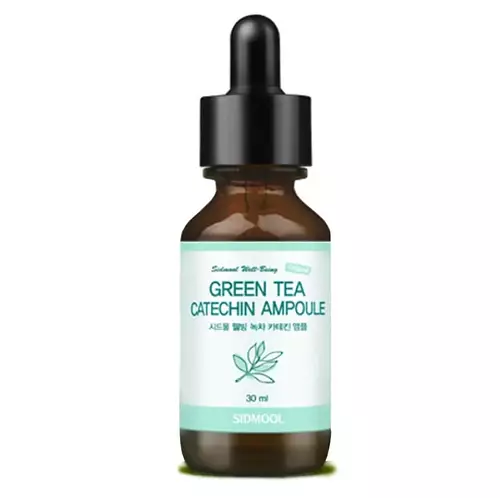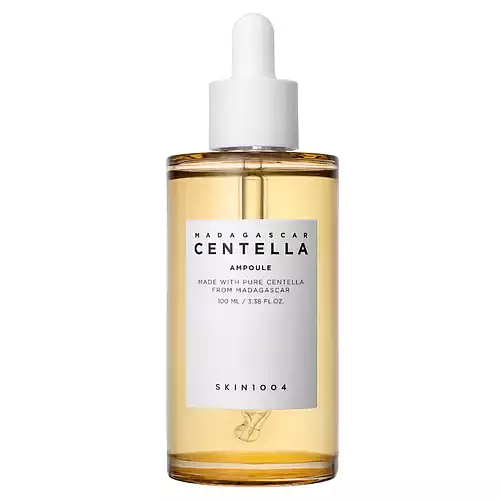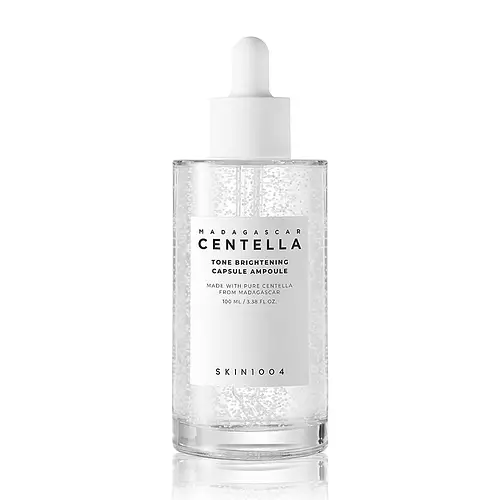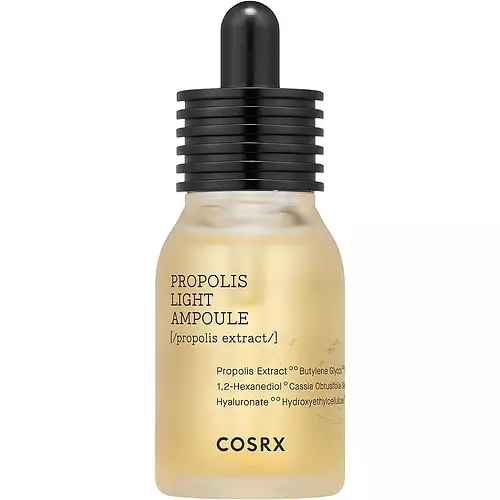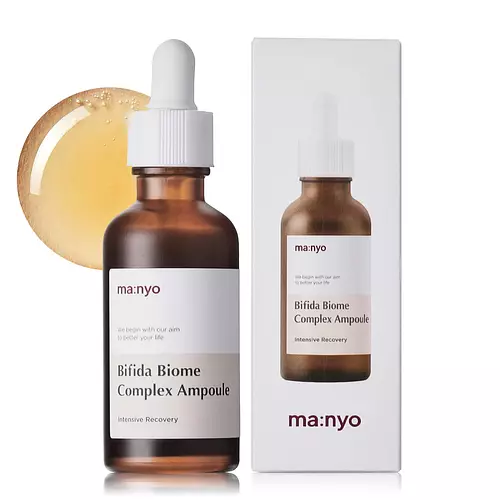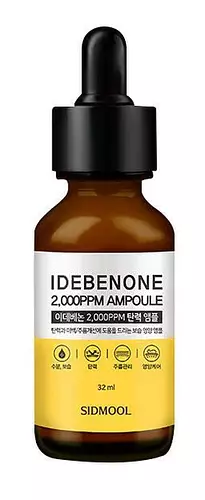
Sidmool Idebenone Elastic Ampoule Ingredients Explained
Published on August 04, 2023 Submitted by marymartinez_481
Overview
What it is
Ampoule with 21 ingredients that contains hyaluronic acid, niacinamide and peptides
Cool Features
It is cruelty-free, fungal acne (malassezia) safe, and reef safe
Suited For
It has ingredients that are good for fighting acne, anti aging, dry skin, brightening skin, sensitive skin, oily skin, reducing pores, scar healing and dark spots
Free From
It doesn't contain any harsh alcohols, common allergens, fragrances, oils, parabens, silicones or sulfates
Fun facts
Sidmool is from South Korea. This product is used in 2 routines created by our community.
We independently verify ingredients and our claims are backed by peer-reviewed research. Does this product need an update? Let us know.
Ampoule with 21 ingredients that contains hyaluronic acid, niacinamide and peptides
Quick info
You should know
Notable Ingredients
This product contains 1 ingredient that may have this attribute:
This product contains 1 ingredient that may have this attribute:
This product contains 5 ingredients that may have this attribute:
Benefits
This product contains 1 ingredient that may have this attribute:
This product contains 1 ingredient that may have this attribute:
This product contains 3 ingredients that may have this attribute:
This product contains 2 ingredients that may have this attribute:
This product contains 1 ingredient that may have this attribute:
This product contains 1 ingredient that may have this attribute:
This product contains 2 ingredients that may have this attribute:
This product contains 3 ingredients that may have this attribute:
This product contains 1 ingredient that may have this attribute:
This product contains 2 ingredients that may have this attribute:
Ingredients 21
Rosa Canina Fruit Extract is from Rosehip. Rosehips are a fruit from a wild rose bush native to Eurasia and Africa.
Glycerin is already naturally found in your skin. It helps moisturize and protect your skin.
Propanediol helps absorb ingredients into your skin, boosting their benefits. It can act as an emollient, making your skin softer. Propanediol can help products last longer by boosting the properties of preservatives within the formulation.
Niacinamide has emerged as an all-star ingredient due to its many benefits.
1,2-Hexanediol is a multi-tasker ingredient. It acts as a preservative to increase shelf-life and can aid other preservatives in preventing microbe growth. 1,2-Hexanediol also helps the skin retain moisture as a humectant.
Butylene Glycol (or BG) is used within cosmetic products for a few different reasons:
Caprylic Acid is a fatty acid commonly found in plant oils, such as palm and coconut oils.
Water. It's the most common cosmetic ingredient of all. You'll usually see it at the top of ingredient lists, meaning that it makes up the largest part of the product.
Sodium Hyaluronate is hyaluronic acid's salt form. It is commonly derived from the sodium salt of hyaluronic acid.
Allantoin plays a role in soothing and moisturizing the skin. Because of this, it is often added to products with strong active ingredients.
Adenosine is in every living organism. It is one of four components in nucleic acids that helps store our DNA.
Xanthan gum is used as a stabilizer and thickener within cosmetic products. It helps give products a sticky, thick feeling - preventing them from being too runny.
Acetyl Hexapeptide-8 is a peptide. A common name for this peptide is Argireline.
Copper Tripeptide-1 is a peptide naturally found in body fluids. Peptides are building blocks for protein.
Ethylhexylglycerin (we can't pronounce this either) is commonly used as a preservative and skin softener. It is derived from glyceryl.
Rosa Canina Fruit Extract 85%, Glycerin, Propanediol, Niacinamide, 1,2-Hexanediol, Butylene Glycol, Caprylic Acid, Hydroxydecyl Ubiquinone, Water, Sodium Hyaluronate, Allantoin, Adenosine, Dipotassium Glycyrrhizate, 2-Hydroxyethyl Acrylate, Xanthan Gum, Oligopeptide-91 Rh-Oligopeptide-1, Rh-Polypeptide-111, Oligopeptide-2, Acetyl Hexapeptide-8, Copper Tripeptide-1, Ethylhexylglycerin
Ingredient Ratings
Based on the number of likes and dislikes each ingredient has received.
Ingredients Explained
Rosa Canina Fruit Extract is from Rosehip. Rosehips are a fruit from a wild rose bush native to Eurasia and Africa.
Rosehip contains Vitamin C, Vitamin E, fatty acids and linolenic acids. These nourish your skin barrier. Having hydrated skin helps reduce the appearance of fine-lines and wrinkles.
Vitamins C and E are potent antioxidants and may help with anti-aging. The fatty acids are emollients that help soften and hydrate your skin.
Another potent vitamin found in rosehip is Vitamin A, or retinol. Retinol encourages collagen production in the skin.
Rosehip extract may help with brightening the skin. Several components, such as beta-carotene, are able to reduce pigmentation caused by sun damage.
Learn more about Rosa Canina Fruit ExtractGlycerin is already naturally found in your skin. It helps moisturize and protect your skin.
A study from 2016 found glycerin to be more effective as a humectant than AHAs and hyaluronic acid.
As a humectant, it helps the skin stay hydrated by pulling moisture to your skin. The low molecular weight of glycerin allows it to pull moisture into the deeper layers of your skin.
Hydrated skin improves your skin barrier; Your skin barrier helps protect against irritants and bacteria.
Glycerin has also been found to have antimicrobial and antiviral properties. Due to these properties, glycerin is often used in wound and burn treatments.
In cosmetics, glycerin is usually derived from plants such as soybean or palm. However, it can also be sourced from animals, such as tallow or animal fat.
This ingredient is organic, colorless, odorless, and non-toxic.
Glycerin is the name for this ingredient in American English. British English uses Glycerol/Glycerine.
Learn more about GlycerinPropanediol helps absorb ingredients into your skin, boosting their benefits. It can act as an emollient, making your skin softer. Propanediol can help products last longer by boosting the properties of preservatives within the formulation.
Propanediol is not likely to cause sensitivity and considered safe to use.
It is derived from corn or petroleum with a clear color and no scent.
Learn more about PropanediolNiacinamide has emerged as an all-star ingredient due to its many benefits.
It is known to treat acne by reducing inflammation. It also helps fade dark-spots and strengthen the skin by promoting the growth of the ceramide barrier.
Other benefits include smoothing wrinkles and minimizing redness.
The cherry on top? Niacinamide can also help build keratin, a protein that keeps skin firm.
When incorporating niacinamide into your routine, look out for concentration amounts. Typically, 5% niacinamide provides benefits such as fading dark spots. However, if you have sensitive skin, it is better to begin with a smaller concentration.
Niacinamide can be mixed with other ingredients to boost benefits. For instance, it has shown to be effective when used with copper, folic acid, and zinc to treat acne.
Learn more about Niacinamide1,2-Hexanediol is a multi-tasker ingredient. It acts as a preservative to increase shelf-life and can aid other preservatives in preventing microbe growth. 1,2-Hexanediol also helps the skin retain moisture as a humectant.
In products that are water-based, this ingredient can help stabilize perfumes and fragrances. It can also help make the texture of products softer and more smooth.
Butylene Glycol (or BG) is used within cosmetic products for a few different reasons:
- It is a solvent, meaning that it helps to dissolve other ingredients. This also enhances the absorption of the product into one's skin.
- It is a humectant, which means that it helps attract moisture into the skin.
- It helps improve product application.
Overall, Butylene Glycol is a safe and well-rounded ingredient. It is unlikely to irritate skin, and works well with pretty much all other ingredients.
Caprylic Acid is a fatty acid commonly found in plant oils, such as palm and coconut oils.
Much of the research is based on caprylic acid derived from coconut oil. Coconut oil is an emollient and helps moisturize the skin.
Caprylic Acid has antimicrobial and antifungal properties. Several studies found it to be effective at treating yeast infections. It also has anti-inflammatory properties. Besides cosmetics, this ingredient is also used for a variety of medical purposes such as treating digestive disorders.
This ingredient is minimally soluble in water.
Read more about a similar ingredient Caprylic/Capric Triglyceride.
Learn more about Caprylic AcidHydroxydecyl Ubiquinone is an antioxidant.
Water. It's the most common cosmetic ingredient of all. You'll usually see it at the top of ingredient lists, meaning that it makes up the largest part of the product.
So why is it so popular? Water most often acts as a solvent - this means that it helps dissolve other ingredients into the formulation.
You'll also recognize water as that liquid we all need to stay alive. Talk about multi-purpose! If you see this, drink a glass of water. Stay hydrated!
Learn more about WaterSodium Hyaluronate is hyaluronic acid's salt form. It is commonly derived from the sodium salt of hyaluronic acid.
Like hyaluronic acid, it is great at holding water and acts as a humectant. This makes it a great skin hydrating ingredient.
Sodium Hyaluronate is naturally occurring in our bodies and is mostly found in eye fluid and joints.
These are some other common types of Hyaluronic Acid:
Learn more about Sodium HyaluronateAllantoin plays a role in soothing and moisturizing the skin. Because of this, it is often added to products with strong active ingredients.
Some studies have shown this ingredient can promote wound healing with higher concentrations.
Allantoin is derived from the comfrey plant but produced synthetically for cosmetic products to ensure purity.
Learn more about AllantoinAdenosine is in every living organism. It is one of four components in nucleic acids that helps store our DNA.
Adenosine has many benefits when used. These benefits include hydrating the skin, smoothing skin, and reducing wrinkles. Once applied, adenosine increases collagen production. It also helps with improving firmness and tissue repair.
Studies have found adenosine may also help with wound healing.
In skincare products, Adenosine is usually derived from yeast.
Learn more about AdenosineDipotassium Glycyrrhizate comes from licorice root.
Extracts of licorice have demonstrated to have antibacterial, anti‐inflammatory, antiviral, antioxidant properties.
One component, glabridin, has extra potent antioxidant and soothing properties. It has also been found to block pigmentation from UVB rays in guinea pigs.
Licorice Root also contains a flavonoid. Flavonoids are a natural substance from in plants. Flavonoids also have antioxidant properties.
Another component, glycyrrhizin, has been found to have anti-inflammatory and antimicrobial benefits. This may make licorice root extract effective at treating acne. However, more research is needed to support this.
Liquiritin is one of the flavone compounds found in licorice. It has been found to help lighten skin by preventing tyrosinase from reacting with tyrosine. When the two react, protein is converted to melanin. Melanin is the substance in your body that gives your features pigmentation.
Licorice root is native to Southern Europe and Asia. It has been used in traditional Chinese medicine to help with respiratory issues.
Learn more about Dipotassium GlycyrrhizateWe don't have a description for 2-Hydroxyethyl Acrylate.
Xanthan gum is used as a stabilizer and thickener within cosmetic products. It helps give products a sticky, thick feeling - preventing them from being too runny.
On the technical side of things, xanthan gum is a polysaccharide - a combination consisting of multiple sugar molecules bonded together.
Xanthan gum is a pretty common and great ingredient. It is a natural, non-toxic, non-irritating ingredient that is also commonly used in food products.
Learn more about Xanthan GumOligopeptide-91 Rh-Oligopeptide-1 is a peptide.
Rh-Polypeptide-111 is a peptide.
Oligopeptide-2 is a peptide.
Acetyl Hexapeptide-8 is a peptide. A common name for this peptide is Argireline.
Argireline has a similar function to botox. It prevents muscle movement and contractions. By preventing muscles from moving, Argireline also prohibits the formation of fine lines and wrinkles. However, research is lacking in proving this ingredient to be as effective as botox.
Argireline tells our body to create more collagen. Collagen is a protein that makes connective tissue. Boosting collagen production leads to a healthier skin barrier. Having a healthy skin barrier means having firm and hydrated skin.
Read more about other common types of peptides here:
Learn more about Acetyl Hexapeptide-8Copper Tripeptide-1 is a peptide naturally found in body fluids. Peptides are building blocks for protein.
Studies show this ingredient tells our body to create more collagen and elastin. Collagen is a protein that makes connective tissue. Elastin is the protein responsible for giving our skin elasticity. Our bodies start to slow down collagen and elastin production with age.
Boosting collagen and elastin production can help create a healthier skin barrier. Having a healthy skin barrier means having firm and hydrated skin. It's a win-win situation!
Studies show this ingredient can help with scar healing. This is because it breaks down damaged collagen, the main component of scar tissue. It may also help with reducing sunspots, acne scars, and uneven skin tone.
This ingredient is also an antioxidant. Antioxidants help the body fight off free-radicals. Free radicals are molecules that damage our cells, such as pollution and tobacco smoke.
More benefits: Copper Tripeptide-1 helps maintain tissues in blood vessels and promote natural hyaluronic acid in skin.
Read more about other common types of peptides here:
Learn more about Copper Tripeptide-1Ethylhexylglycerin (we can't pronounce this either) is commonly used as a preservative and skin softener. It is derived from glyceryl.
You might see Ethylhexylglycerin often paired with other preservatives such as phenoxyethanol. Ethylhexylglycerin has been found to increase the effectiveness of these other preservatives.
When to use
How this product is used by our community
Compared With
Here are some products that it's often compared with
More Sidmool Products
See all Sidmool productsMore Ampoules
See all ampoulesWe're dedicated to providing you with the most up-to-date and science-backed ingredient info out there.
The data we've presented on this page has been verified by a member of the SkinSort Team.
Read more about us

